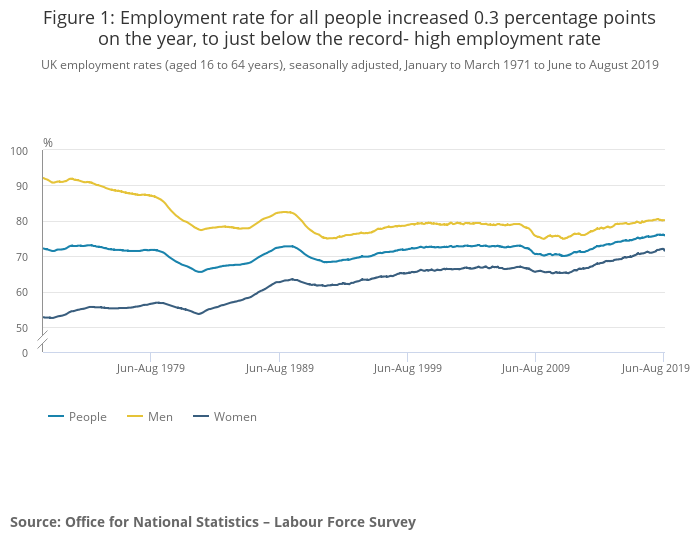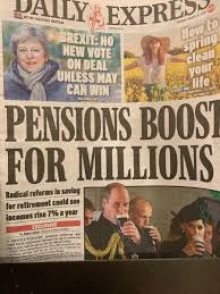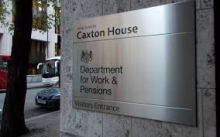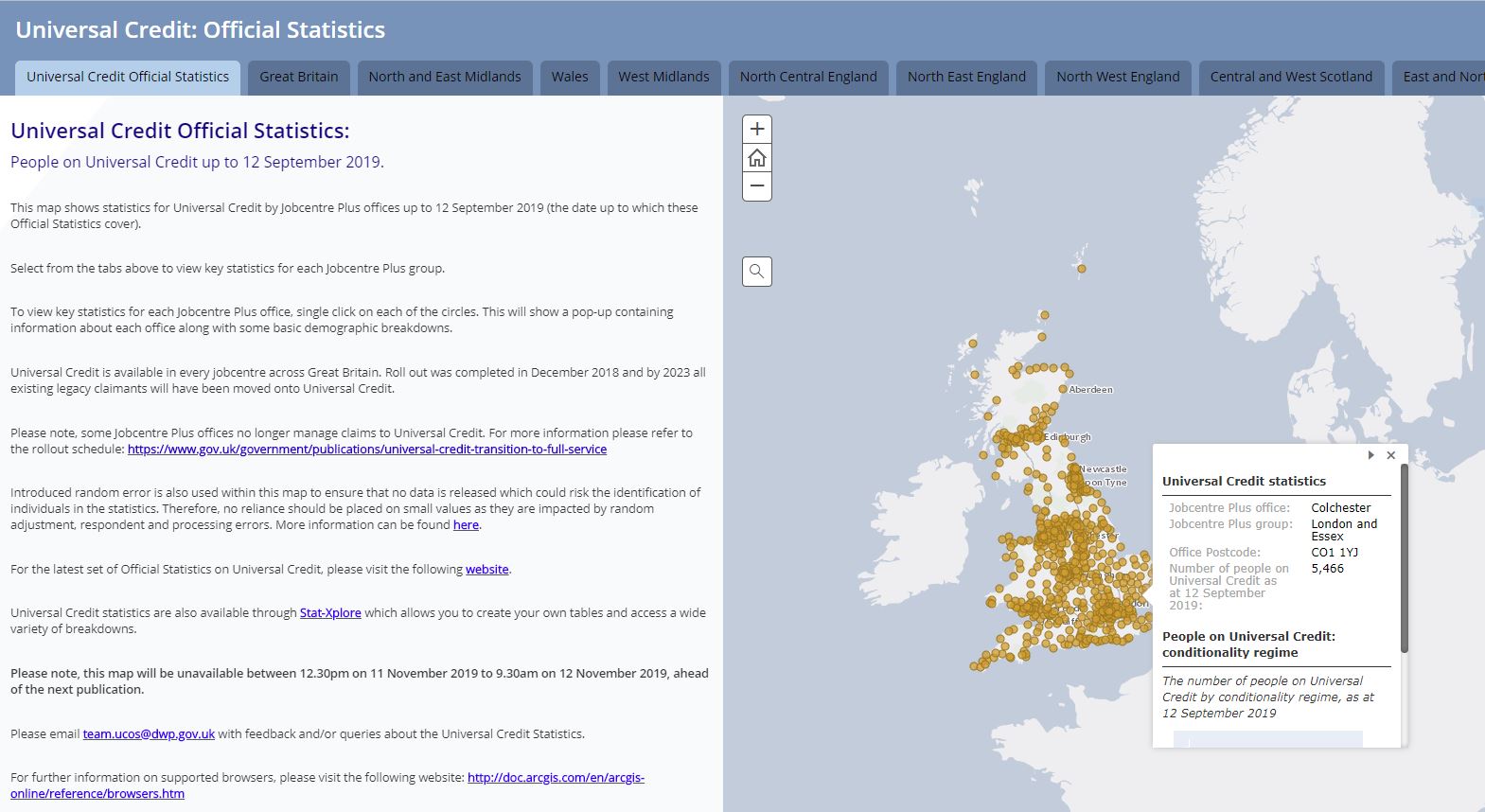Work TV
Watch our TV Channel dedicated to the ‘World of Work’. Explore our video library for informative videos featuring career opportunities at leading companies, franchising opportunities, further education and recruitment professions and their services.
Simon Collyer
Labour Market Statistics: October 2019
Commenting on Octobers figures, ONS deputy head of labour market statistics Matt Hughes said:
“The employment rate is still rising year-on-year, but this growth has cooled noticeably in recent months. Among the under-25s, the employment rate has actually started to fall on the year.
“Pay growth continues to outstrip inflation, as it has done for over eighteen months now.”
- The UK employment rate was estimated at 75.9%, higher than a year earlier (75.6%) but 0.2 percentage points lower than the previous quarter.
- The UK unemployment rate was estimated at 3.9%, this is lower than a year earlier (4.0%) but 0.1 percentage points higher than the previous quarter.
- The UK economic inactivity rate was estimated at 21.0%, this is lower than a year earlier (21.2%) but 0.1 percentage points higher on the previous quarter.
- Estimated annual growth in average weekly earnings for employees in Great Britain was 3.8% for both total pay (including bonuses) and regular pay (excluding bonuses).
- In real terms (after adjusting for inflation), annual growth in total pay was estimated to be 1.9% and annual growth in regular pay was estimated to be 2.0%.

ABC Comment, have your say below:

Queens Speech Confirms Implimentation of CDC Pensions
QUEENS SPEECH - The Queen has confirmed that the implementation of the Pensions Schemes Bill will be brought forward, legislating for the introduction of pensions dashboards as well as collective defined contribution (CDC) pension schemes.
The Bill was one of the measures announced in the Queen’s Speech, delivered on Monday 14 October 2019 to officially open Parliament. She said: “To help people plan for the future, measures will be brought forward to provide simpler oversight of pensions savings. To protect people’s savings for later life, new laws will provide greater powers to tackle irresponsible management of private pension schemes.”
What is a CDC (Collective Defined Pension Scheme)?
Collective defined contribution pension schemes according to the government.
Defined contribution pension schemes would be a new and different kind of retirement saving for the UK – already in use in the Netherlands and Norway – but would require new legislation to bring into effect and until recently there was not much impetus, from Government or the private sector, to make that happen.
However, with a deal finally hammered out between Royal Mail and the CWU just this month, after major negotiations over employment conditions and benefits to avert strike action last year, collective defined contribution (CDC) pension schemes in the UK are suddenly more of a real possibility.
Also known as a form of "defined ambition" scheme, they differ from Defined Benefit (DB) schemes in that members are not promised a certain retirement income. As we are seeing often (and the Committee regularly investigates such cases), the company sponsors of DB schemes are not always willing or able to maintain those promises. That is one of the problem CDC pensions aim to address.
A CDC scheme instead has a target or "ambition" amount it will pay out, based on a long term, mixed risk investment plan. CDCs aim to pay out an adequate level of index-linked pension for life but this is an ambition rather than a contractual guarantee. They have the scope to redefine the benefits they offer if circumstances - like adverse economic conditions - require.
Regular retirement income
CDC differs from the traditional Defined Contribution (DC) schemes that are largely replacing DB schemes in that it does not produce an individual "pension pot", which you then have to decide how best to use for your retirement, but pays out a regular retirement income from the collective fund.
Thus, CDC schemes take the big central decision of pension freedoms out of retirement planning, and also much of the risk.
ABC Comment have your say below:

Northern Ireland Labour Market Statistics
LATEST STATISTICS - The labour market statistics were published today by the Northern Ireland Statistics & Research Agency (NISRA).
NI unemployment rate remains below UK rate.
The latest NI seasonally adjusted unemployment rate for the period June-August 2019 was estimated from the Labour Force Survey at 2.9%. The unemployment rate decreased over the quarter by 0.2 percentage points (pps) and decreased by 1.1pps over the year.
The annual change in the unemployment rate was statistically significant, i.e. the recorded changes exceeded the variability expected from a sample survey of this size and is likely to reflect real change.
The NI unemployment rate (2.9%) was below the UK rate (3.9%), the European Union (6.3%) rate for July 2019 and the Republic of Ireland (5.3%) rate for July 2019.
Employment rate decreased while economic inactivity rate increased over the quarter.
The employment rate (71.5%) decreased over the quarter by 0.3pps and increased over the year by 1.7pps. The changes in the employment rate were not statistically significant, i.e. the recorded change did not exceed the variability expected from a sample survey of this size.
The economic inactivity rate (26.4%) increased over the quarter by 0.4pps and decreased over the year by 0.9pps. The changes in the employment rate were not statistically significant, i.e. the recorded change did not exceed the variability expected from a sample survey of this size.
Number of proposed redundancies highest since 2003
A total of 1,452 redundancies were proposed in September 2019, higher than the previous monthly total of 331. The number of proposed redundancies is the highest monthly total since 2003.
The number of confirmed redundancies (1,976) in the most recent 12 months is lower than the number reported in the previous 12 months (2,896). NISRA, acting on behalf of the Department for the Economy, received confirmation that 286 redundancies took place in September 2019.
It should be noted that the confirmed total provides a better indication of real job losses than the proposed total.
The confirmed figures provided are likely to be an underestimate of total job losses, as under the Employment Rights (Northern Ireland) Order 1996 (Amended 8 October 2006) companies are only legally required to notify the Department of impending redundancies of 20 or more employees. Companies who propose less than 20 redundancies are not included in the statistics.
Commentary
The Labour Force Survey shows that the employment rate decreased over the quarter to (71.5%), while the unemployment rate decreased to one of its lowest rates of 2.9% and economic inactivity increased to 26.4%.
Despite the quarterly decrease, the employment rate at 71.5% is one of the highest on record and significantly above rates in 2017. Similarly, the economic inactivity rate remains significantly below rates in mid-2017.
Although the NI unemployment rate remains below the UK rate and is the second lowest of all the UK regions, NI has the second lowest employment rate and highest inactivity rate in the UK.
ABC comment, have your say below:

Universal Credit Interactive Map Learn About Your Areas Claims
UC STATISTICS - As we say here at the ABC:
'90% of people are not sure if they belive in statistics, the other 10% don't know' (Boom, Boom).
This interactive map shows how many Universal Credit claims are live and in what areas.
http://dwp-stats.maps.arcgis.com/apps/MapSeries/index.html?appid=f90fb305d8da4eb3970812b3199cf489
ABC Comment, have your say below:

DWP Staff on Strike
STRIKE ACTION - The civil service’s biggest union has claimed responsibility for a hiring drive that is expected to create 56 new Department for Work and Pensions roles in Derby related to Universal Credit.
PCS said members at the city’s Universal Credit service centre were angry about high workloads that made it impossible for them to provide a high quality service for customers, and that a meeting in August had underscored the willingness of staff to strike over the issue.
Staff at Universal Credit centres in Walsall and Wolverhampton staged strike action earlier this year in a bid to end what they described as “intolerable” workloads related to the administration of the long-running six-into-one benefit reform.
PCS said that a meeting with management in Derby last month had resulted in proposals to recruit 40 additional Universal Credit staff on one-year contracts, but that the number had been negotiated up to 56.
PCS said that the jobs had now been advertised and appointments were due to be made towards the end of this month. It added that it was hoped the roles could become permanent after the initial fixed terms expired.
Last month, the Labour party floated proposals to scrap Universal Credit and introduce machinery of government changes that would reconfigure the DWP, if it won power at the next general election.
In a speech made in former work and pensions secretary Iain Duncan Smith’s Chingford and Woodford Green constituency, Labour leader Jeremy Corbyn said Universal Credit had been an “unmitigated disaster”.
Originally expected to be fully implemented by 2017, the Universal Credit programme has been subject to multiple resets since first being taken forward by Duncan Smith in the 2012 Welfare Reform Act. It is currently expected to be fully implemented by 2023.
Current work and pensions secretary Thérèse Coffey is the sixth holder of the role since Duncan Smith resigned in March 2016, saying cuts to personal independence payments for disabled people were “a compromise too far”.
ABC Comment, have your say below:

Challenge Poverty Week Scotland Wraps Up
POVERTY - More than 300 organisations have taken part, organising over 400 events across Scotland! Supporters included 15 faith leaders, 20 local authorities, schools, football clubs, businesses, politicians, trade unions, third sector, public sector, think tanks and community activists.
An amazing variety of supporters that have added their voices to the campaign asking for more radical action to loosen the grip of poverty on people’s lives. For a glimpse of the activities, you can scroll down Challenge Poverty's twitter feed: https://twitter.com/CPW_Scotland
ABC Comment, have your say below:

New £20 Note Replaces Britain’s Most Forged Note
MONEY - The Bank of England has unveiled the new £20 note, which contains “sophisticated security features”, making it the “most secure Bank of England banknote yet”. It has two windows and a two-colour metallic hologram which makes it harder to counterfeit. The note has also been designed to make it easier for blind people to recognise, with “different colour palettes, differing sizes and raised print”.
The note features painter JMW Turner and one of his most famous works, The Fighting Temeraire. It will be issued in February 2020.

ABC Comments, have your say below:

The ABC Asks MP Questions About Parking Companies and Data Protection
PARKING COWBOYS - Our Colchester MP Will Quince (Cons.) is taking up an interesting matter on our behalf regarding private parking companies - as an example, Parking Eye Limited.
We are asking if merely parking in a parking space managed by a private company … does that mean we have consented for the Company or the hotel whose car park they manage…for them to use our data for ‘marketing purposes’ as an example?
Many supermarkets are using cameras to track customers, but does use a car park to go shopping or visit a hotel mean we have really ‘consented’ to have our data used in this manner? What if we have had no opportunity to read the Terms and Conditions on the Company’s website.
Companies who do this are assuming an awful lot. People are concerned about who has their data and how it is used. In the digital world maintaining privacy is getting harder and harder.
We also want to stop the practice where companies like Parking Eye Limited issue Court summons but do not pay a fee. Motorists can feel intimidated by a court action that the company may not proceed with..if they feel the motorist cannot afford to pay or is going to put up a fight. Private parking companies cannot fine people, they can only sue the motorist for breach of contract.

Image: Will Quince MP (Colchester. Cons).
We are looking into this matter and we hope to have more information in time. Well done to our MP for taking forward these interesting points.
ABC Comment have your say below:

Workers of the World Disconnect
UNPLUGGED - The right to switch off, sometimes called the ‘right to disconnect’, refers to a worker’s right to be able to disconnect from work and refrain from engaging in work-related electronic communications, such as emails or other messages, during non-work hours.
This concept has developed as a result of advancements in communication technologies and its impact on people’s daily lives. The widespread use of smart phones and other digital devices means that always being ‘on call’ has become a reality in many workplaces, as continuous remote access can create pressure for employees to be constantly accessible. The expectation that workers are available at almost any time for online or mobile communication is now considered to be potentially hazardous to workers’ health.
“France, Italy and Spain all have legislation now in place. As World Mental Health Day comes to an end, should not the UK be following this trend and implementing our own legislation?
ABC Comment, have you say below:

North Lanarkshire Council Feels the Pressure of Government Cuts
GOVERNMENT CUTS - North Lanarkshire Council are warning of huge cuts.
Councillors were presented with a ![]() comprehensive five year financial plan [753kb] (2020/21 to 2024/25) at a meeting of the Policy and Strategy Committee on Thursday 26 September.
comprehensive five year financial plan [753kb] (2020/21 to 2024/25) at a meeting of the Policy and Strategy Committee on Thursday 26 September.
The council budget will be set in February next year.
Around 80% of council funding comes from the Scottish Government and the council is projecting a budget shortfall of £100million over the next three years alone.
In addition, the council is facing significant cost pressures from other areas including:
- The rising costs of caring for an elderly population
- Increased employee costs
- Inflationary increases

Image: Cllr Paul Kelly
Cllr Paul Kelly, Depute Leader of North Lanarkshire Council, said: "There's no doubt that these cuts will have a devastating impact on our communities. We've already been forced to reduce revenue spending by £112million since 2013/14 and there are no pain-free areas where savings can be made.
ABC Comment, have your say below:


























